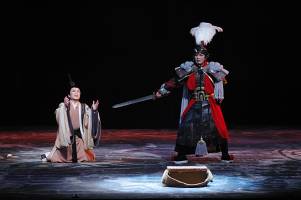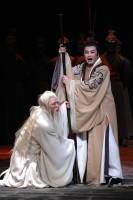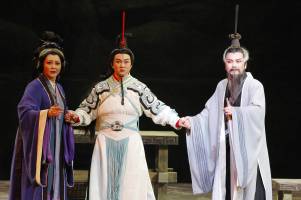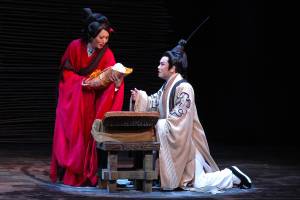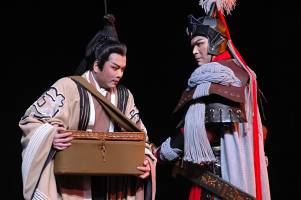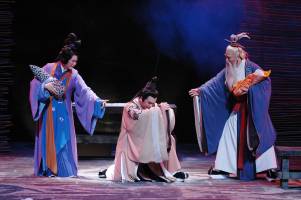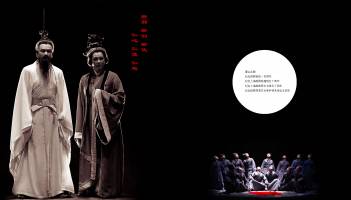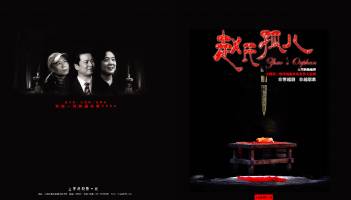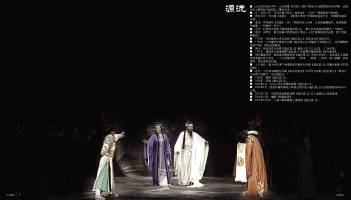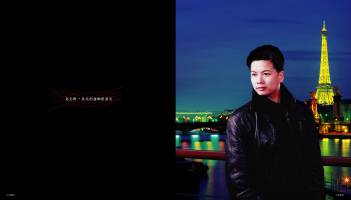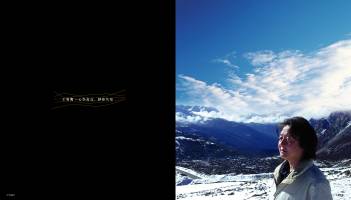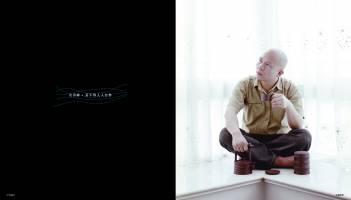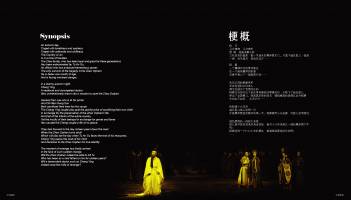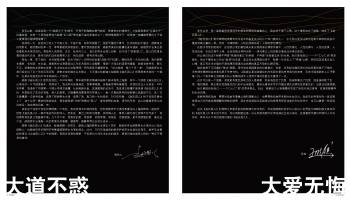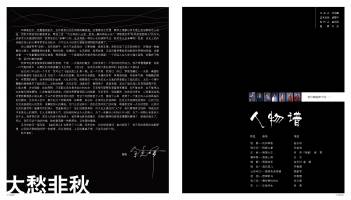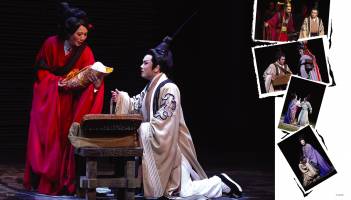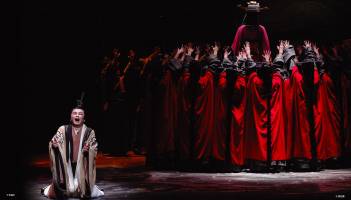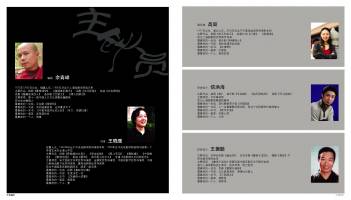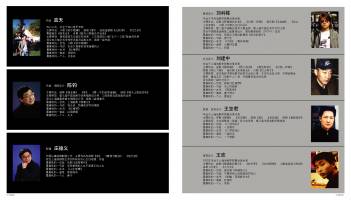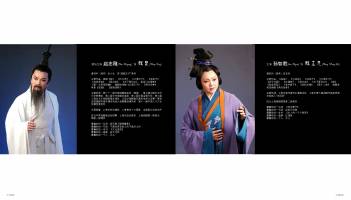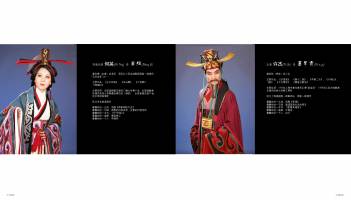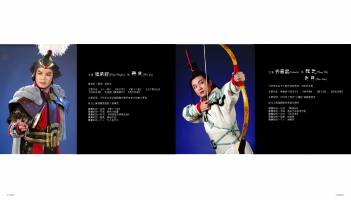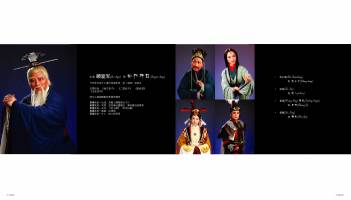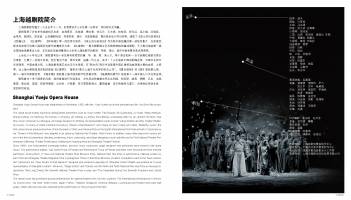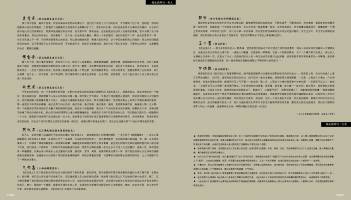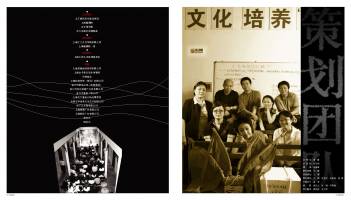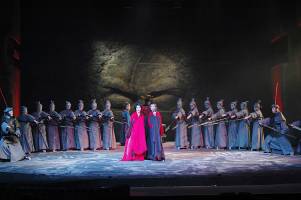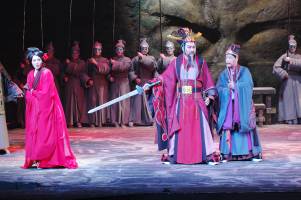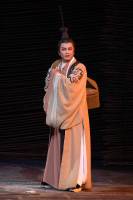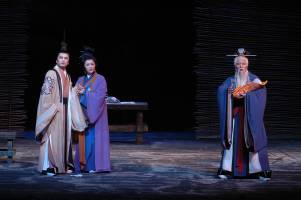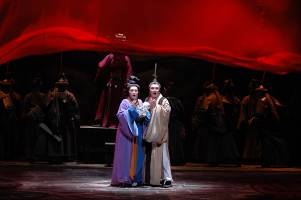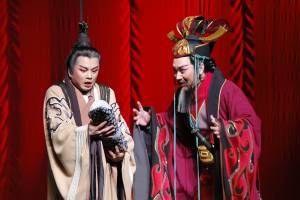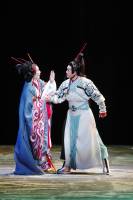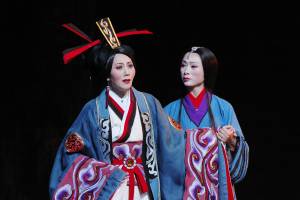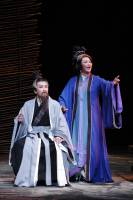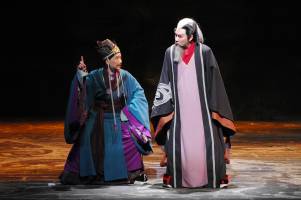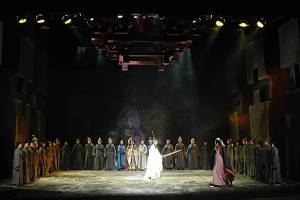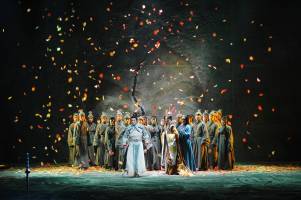Siyuan, we need a map to show where the genres are popular in the geographical sense.
The Orphan of Zhao (Zhaoshi guer)
Genre: yueju
Produced by Shanghai Yueju Theatre, 2005
Playwright: Yu Qingfeng
Director: Wang Xiaoying
Performers: Zhao Zhigang, He Ying, Sun Zhijun, Xu Jie, Qi Chunlei
Introduction to one of the main works in the Pilot:
We use act 4 of the yueju version of The Orphan of Zhao as one of the main works in the pilot; the performance is bilingually subtitled. There are also more accompanied documents including programmes and critical essays.
About the genre
Yueju, also called shaoxingxi, is a regional genre in the xiqu form, specifically popular in Shanghai, and in Zhejiang and Jiangsu provinces. Yet there are yueju companies in other provinces too.
In about 1906, the tea-picking songs in the Shengxian area in Zhejiang were developing into a simple theatrical form by some local troupes. In 1916, some actors went to Shanghai to perform the new genre. The urban competitive environment made actors quickly start absorbing singing melodies from a much older Zhejiang local theatre called shaoju, which had an origin back to the 17th century with a big variety of roots in different musical systems, and learning from jingju’s movements and its division role types. The visual aspects of yueju including costumes, makeup and the scenery were also influenced by the Shanghai cosmopolitan life style. In the early 1920s, all female casting started and replaced the earlier all male or mixed cast members. After 1949, the central government advocated the mixed casting system, male actors were trained, and it was not until after the Cultural Revolution [LINK External] that all female casting companies re-emerged. Yueju today is performed by either a mixed or an all-female cast. The protagonist Cheng Ying in this production was performed by Zhao Zhigang, a male performer, yet his style of singing and acting follows the Yin School, established by actress Yin Guifang for the yueju sheng role type.
Yueju’s role type of category follows jingju’s. Its music and arias are gentle and soft, yet comparing to the melodious kunju [LINK kunju] the pace is faster and the lyrics are easy to follow. It is good at telling romantic stories without much display of acrobatics or martial arts, and thus most of the traditional repertoire is set around the role types of young scholar and young female roles. The most famous actors are also specialized in these two role types.
Scenario:
The Orphan of Zhao is a play based on historical records. [Link to the Exhibition] The orphan was born circa 583 BC during the Spring-Autumn Period – a time when imperial power was being eroded by the growth of numerous aristocratic-family-states. Appalled by the chaos and bloodshed, philosophers such as Confucius (551-479 BC) acted as advisors to rulers on how to control their states and people.
Historical records present contradictory accounts of the story. Most versions of different theatrical genres and films we see now are based on the extant full-length tragedy Wrongs Avenged by the Orphan of Zhao by Ji Junxiang, written in the Yuan dynasty when China was ruled by the Mongols (1279-1368 AD).
The basic story is as follows: schemed by the evil courtier Tu’an Gu, the Zhao clan were all killed except for the Princess who was the Jin Ruler’s sister and was pregnant. After the baby was born, he was smuggled out by a doctor called Cheng Ying. Having realized that the baby boy had escaped, Tu’an Gu gave the order to kill all the newly born boys in the country. Finally, Cheng Ying decided to give up his own child for the Zhao orphan. Meanwhile Cheng Ying and his friend, a retired minister Gongsun Chujiu made a plan. Cheng would report to Tu’an about Gongsun who had the Zhao orphan in his house. Actually the real Zhao orphan was hidden in the deep mountain while Cheng’s own baby son was with Gongsun. Tu’an killed both Gongsun and the child. In order to reward Cheng Ying as a loyal reporter, Tu’an took both Cheng Ying and his son (but actually Zhao’s offspring) to his house and Tu’an made himself the foster father of the boy.16 years later, Cheng Ying revealed the true story to the young man. The orphan of Zhao took the revenge on Tu’an, for his parents, grandparents, his clan and for Cheng Ying. In order to rescue this orphan many people died.
This is an archetypal Chinese story of loyalty, honesty, sacrifice, friendship, evil, revenge, bravery, and justice.
The choice to use act 4 in the Pilot was made by the playwright Yu Qingfeng, because in his mind Cheng Ying was never a hero, but a “normal man”. Yu described Cheng as an ordinary doctor; he loved his wife and the newly born baby dearly. This act showed how he decided to sacrifice his own son for the orphan of Zhao, and how his wife finally gave the husband her consent. Gongsun Chujiu, the retired minister, insisted that he should die with the baby because the Chengs were still young enough to possibly have another child …
This 21st century’s yueju production interprets Cheng Ying not as a man abandoning life, nor is he reckless in desperation. Having witnessed the brutal death of both old Gongsun and his own child, Cheng bravely chooses a long-suffering path of raising the orphan for 16 years, despite being cursed and reviled by people who are unaware of the truth. Indeed, this is a play about human beings, their feelings and sufferings.
In addition to act 4, there is also a trailer of the production that the Hangzhou Municipal Media Group and the Shanghai Yueju Theatre made for the Leeds international symposium Performing China on the Global Stage, held in March 2013.
Images and the video are courtesy of the Shanghai Yueju Theatre and the Hangzhou Municipal Media Group.
《赵氏孤儿》
剧种:越剧
演出单位:上海越剧院,2005年
编剧:余青峰
导演:王晓鹰
演员:赵志刚、何英、孙智君、许杰、齐春雷
剧种简介:
越剧是戏曲剧种,也叫作“绍兴戏”,流行于上海以及浙江和江苏等地。全国很多其他省市也拥有越剧团。
1906年前后,浙江嵊县一带的采茶歌在余姚秧歌班的影响下开始发展成为简单的戏剧形式。1916年,一些演员带着这个新出现的剧种来到上海演出。大城市里不同演出形式的强烈竞争促使演员迅速向浙江本地古老的绍剧汲取更多唱腔与音乐手段,也开始学习京剧的行当、舞蹈、身段等等表演艺术。越剧中的服装、化装以及舞台布景等等视觉形象方面颇受上海十里洋场生活的影响。1920年代出现了全部由女演员组成的“文武女班”,抗日战争期间女班有很大发展,“男班”以及男女合演渐趋淘汰。 1949年以后,中央政府提倡男演男、女演女,越剧开始训练男演员。一直到文革以后女子越剧团体才又重新出现。越剧目前有男女共同演出,也有纯粹女子剧团的演出。该剧主角程婴的扮演者是男演员赵志刚,宗尹桂芳派。
越剧的行当分布基本跟随京剧。音乐与唱腔柔和,然而,与“水磨腔”的昆剧相比,越剧唱起来速度快一些,唱词也浅显易懂。越剧擅长演出男女情长的内容,并没有太多武打类的表演,传统剧目往往环绕小生与小旦而设计,因此越剧以扮演青年人物的生、旦两行的演员出名。
剧情简介:
《赵氏孤儿》是一个春秋时代的故事。〔LINK 展览〕。据史书记载,孤儿出生于公元前583年左右。当时受到“分封制”诸侯日益强大势力的侵蚀,周王权日益衰微,诸侯争霸称雄,战争与血腥屠杀连年不断。同时,诸子百家学说开始出现,并试图就如何管理国家和人民等等给予统治者以哲学性的思考。
史书有着互相矛盾的关于赵氏孤儿的记载。我们现在所看到的各种戏剧形式和电影版本基本上来自于元代纪君祥的《冤报冤赵氏孤儿》。
大致故事如下:奸臣屠岸贾设计将与自己不和的赵氏家族满门抄斩,唯一幸免的是已有身孕的、赵朔的妻子庄姬,她是晋王室的公主。男婴出生以后,就被一位叫作程婴的医生想办法带出了宫苑。当屠岸贾听说婴儿已经逃遁,便下令杀死举国上下所有在这段时期内出生的男婴。几经考量,程婴决定献出自己的亲生儿子以保全赵家唯一的骨血。与此同时,程婴和老友、已经告老还家的公孙杵臼安排了救孤的计划。程婴前往屠岸贾处报告公孙杵臼藏匿了赵氏的孤儿,而实际上,真正赵家的孤儿被藏在深山之中,而公孙那里的婴儿恰恰是程婴自己的孩子。屠岸贾杀死了公孙杵臼和婴儿,为报答程婴举报之功,他把程婴及其儿子(是真正的赵氏孤儿)接回自己家里,好生款待,并把男孩作为自己的养子来呵护养育。孤儿长大成人以后,程婴将孤儿的身世告诉了他本人。为给自己的父母、祖父母、赵氏家族以及为程婴报仇,孤儿杀死了屠岸贾。为了拯救孤儿,诸多英雄献出自己的生命。
《赵氏孤儿》是关于忠义、诚信、牺牲、友情、奸佞、报仇、勇猛和正义的中国原型。
在资料库实验版本中使用越剧《赵氏孤儿》第4场是编剧的选择,因为在他看来,程婴并非是英雄,不过是一个“普通的人”。余青峰把这个人物描写成为一个草泽医生,他热爱自己的妻子和刚刚出生的儿子。第4场描绘了他如何决定舍亲子去救赵家骨血,也让观众看到他的妻子如何最终同意了丈夫的决定。年迈的公孙杵臼坚持自己去死,因为他感到程氏夫妇还算年轻,他们还可以为自己再生一个孩子,他坚持“好人是不能绝后的!”
这部21世纪作品中的程婴并非不顾及身家性命,不顾一切“铤而走险”。正是在目睹了韩厥将军为了放孤而刎颈自杀,又感受到公孙老人为了救孤而敢于担当之后,他勇敢地走上了漫长、受苦、抚养孤儿长大16年的道路。这是他忍辱负重的16年,他坚忍,承受着不明真相的世人的唾骂。这是一部关于普通人、他们的感情以及痛苦的戏剧。
除了第4场以外,实验版本还收有一部上海越剧院和杭州市文广集团在2013年为国际研究互联网项目“舞台中国”召开国际会议“寰球演出中国”时专门制作的有关该剧演出的短片。
诚挚感谢上海越剧院和杭州市文广集团提供图片和录像。
